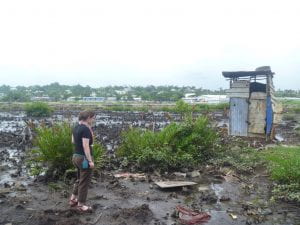Water and sanitation marketing is employed with varying degrees of success to deliver services to impoverished urban and rural communities. This project developed an understanding of rural water and sanitation markets and the demand for services in the Pacific region using a Community-based Participatory Research method. The research findings provided WaSH sector stakeholders with guidance, advice and support on enabling sustainable, demand-driven water and sanitation services. This project is funded by the Australian Government DFAT and is in collaboration with the International WaterCentre, Monash University, University of the South Pacific and Live and Learn (an NGO).
Role: Lead Researcher
Climate Change and Water Supply and Sanitation on Atolls and Flood-prone Catchments in the Pacific
Climate change poses real threats to development and health in the Pacific, particularly through its impacts on freshwater resources. Water Institute researchers and collaborators integrated climate change impacts and current practices to develop a framework that enables communities and water managers to navigate from understanding impacts to evaluating adaptation options for water supply and sanitation, and work with stakeholders to explore risks for both atoll and flood-prone catchments, develop models that incorporate current management and adaptation opportunities and produce tools to aid in adapting to climate change.
Role: Lead Researcher
Using data to strengthen WaSH systems in the Pacific
The Pacific Island Countries as a group failed to meet the MDG target for drinking water and sanitation. The Water Institute’s collaboration with UNICEF Pacific aims to strengthen national WaSH monitoring and implementation in the SDG era through work in Fiji, Vanuatu, and Solomon Islands. In each country, the Water Institute supported UNICEF and their local government and NGO partners through data analysis and recommendations for systems strengthening.
Role: Lead Researcher
Understanding Processes for Sustainability in Community-Managed Water Supply Systems
Some community-managed water systems in Sub-Saharan Africa continue to function for decades while others fail shortly after implementation. With support from World Vision, The Water Institute at UNC explored and mapped processes that support highly functional community-managed water systems. Researchers used qualitative and participatory research methods including interviews, focus groups, systems mapping, and observations in Kenya, Ghana, and Zambia. Insights from this study have informed improvements in policy and practices to advance health and productivity by sustaining water systems.
Role: Research Advisor
Testing CLTS Approaches for Scalability
Successfully mobilizing communities to become open defecation free appears to depend greatly on the skills of local facilitators. Research is needed to understand the essential aspects of the facilitation and mobilization process and how it could be scaled to national level and/or replicated in other countries. This project aims to advance rural sanitation efforts in Kenya, Ethiopia, Ghana, and worldwide by improving the cost-effectiveness and scalability of the community-led total sanitation (CLTS) approach, with a particular focus on the role of local actors, such as teachers, local government staff, and natural leaders through applied research from interventions in Kenya, Ghana, and Ethiopia.
Role: Researcher
Millennium Water Alliance Water Quality Study
There is little data about rural areas, particularly kebeles (communities), and even less data about household stored water (HSW) quality. An integrated water quality study is being conducted in more than 300 villages across Ethiopia. Water was tested for E. coli, fluoride, arsenic and pH and strengthened by the collection of water storage, sanitation and hygiene indicators to examine factors linked to water quality. The data in the results of the study were shared with MWA and its partners and also made available to the Government of Ethiopia to improve water quality at the local and national levels.
Role: Lead Researcher
UNIEEF Ethiopia Integrated WASH/MUS/CBN Program Evaluations
The integrated Water, Sanitation and Hygiene (WaSH), Multiple Use Services (MUS) and Community Based Nutrition (CBN) program is a large scale rural program jointly implemented by the Government of Ethiopia (GoE) and UNICEF. This five-year project is designed to respond to the combined risks of chronic malnutrition and poor access to water, sanitation and hygiene (WaSH) services and water for local production, thereby contributing to improved food security, child health and reproductive and sexual health outcomes. The Water Institute at UNC analyzed data from the baseline evaluation, and then designed, carried out and analyzed data for the midline evaluation.
Role: Lead Researcher
Monitoring and Evaluation of the Conrad N. Hilton Foundation Water, Sanitation and Hygiene Initiative
This project engages a team of researchers to evaluate the funded programs and WASH initiatives of the Conrad N. Hilton Foundation. It employs a combination of research methods to assess and select WASH indicators for programs, measure initiative progress, and advise grantees on data collection. Key deliverables involve developing a learning tool to increase effectiveness of initiatives and developing a compendium of best practices and lessons learned.
Role: Researcher
